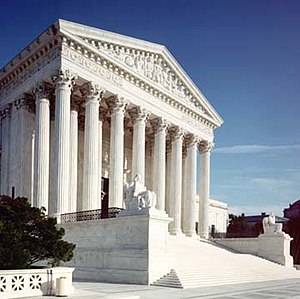 Image via Wikipedia
Image via Wikipedia
Today is Monday, November 7, 2011 - It is a good day to be alive, despite the bad things that are happening. What I have read in the news this morning raises for me a number of important questions in the legal realm.
As the Feds seek unfettered GPS surveillance power as location-tracking flourishes, I feel alarmed at the growth of domestic sureillance in our day to day lives. Tomorrow the Supreme Court of the United States will hear arguments about whether law enforcement can attach a GPS tracking device to a vehicle without a probable cause warrant from a judge. Where is the Constitution's Fourth Amendment protection? As Wired blogger David Kravets wrote,
The Implications of DOJ’s FOIA “Lies,” according to blogger emptywheel, have all kinds of possibilities for the abuse of our civil liberties. How is it that the government can lie when it comes to matters involving the lega lights of citizens? To quote and list:
Mississippi [is] to decide if [a] fertilized egg is a human being on Tuesday. If the proposition wins it could put women's lives in jeopardy, threaten birth control and would certainly be legally challenged in many different ways. Will it truly put Roe vs. Wade in the biggest danger since it was adopted? Reuters has the story.
From a constitutional, ethical or procedural point of view, these news stories raise important questions. What questions do you have?
As the Feds seek unfettered GPS surveillance power as location-tracking flourishes, I feel alarmed at the growth of domestic sureillance in our day to day lives. Tomorrow the Supreme Court of the United States will hear arguments about whether law enforcement can attach a GPS tracking device to a vehicle without a probable cause warrant from a judge. Where is the Constitution's Fourth Amendment protection? As Wired blogger David Kravets wrote,
Technology has advanced since both of these cases, feeding the government’s growing hunger for cost-efficient, easy-to-use spy tools, and making the latest debate before the justices seem Orwellian. Today, one’s exact position on Earth can easily be secretly monitored with devices costing less than $200. Add to this the government’s argument in court briefs that “a person has no reasonable expectation of privacy in his movements from one place to another,” and you have the makings for widespread, unchecked surveillance.
The Implications of DOJ’s FOIA “Lies,” according to blogger emptywheel, have all kinds of possibilities for the abuse of our civil liberties. How is it that the government can lie when it comes to matters involving the lega lights of citizens? To quote and list:
. . . the practice of DOJ for nearly a quarter century to provide misleading information in response to FOIAs asking for certain kinds of information–broadly, ongoing investigations, informants, and foreign intelligence. In this post I want to consider how the practice may be ripe for abuse.
- Ongoing Legal Investigation - The first exclusion–for information that might tip the subject of an investigation into a potential crime to that investigation and therefore lead her to, for example, destroy evidence–makes a bit of sense. But it seems ripe for abuse in several ways.
- Informants - The second exclusion prevents people from asking for information on people they suspect might be informants by name. So, for example, if a peace group thinks Joe Smith asks too many question about group members’ pot smoking and therefore might be an informant, their FOIA request for information on him could be excluded.
- Classified FBI records on “foreign intelligence or counterintelligence, or international terrorism” - As with the other two exclusions, there’s some logic to the third, covering classified FBI records on foreign intelligence, counterintelligence, or international terrorism. . . . logic held before 9/11 turned the “foreign intelligence” category into a giant grab bag.
A . . . man who owned for-profit juvenile detention centers was sentenced to 18 months in prison . . . for paying judges to send youths to his facilities in a so-called "kids for cash" scheme. Robert Powell, 53, a former trial lawyer . . . also must pay $60,000 for his involvement in the scheme. He was found guilty in 2009 of paying $770,000 in kickbacks to then-judges Mark Ciavarella Jr. and Michael Conahan, who in return sent youths to his detention centers.
Mississippi [is] to decide if [a] fertilized egg is a human being on Tuesday. If the proposition wins it could put women's lives in jeopardy, threaten birth control and would certainly be legally challenged in many different ways. Will it truly put Roe vs. Wade in the biggest danger since it was adopted? Reuters has the story.
Mississippi . . . could be the first state in the nation to define a fertilized egg as a person, a controversial concept aimed at outlawing abortion, some types of birth control and infertility methods that result in the loss of embryos. The so-called "personhood amendment" to the state constitution represents a twist in strategy for anti-abortion efforts, which have notched great success across the country this year with dozens of new restrictions put into law.
From a constitutional, ethical or procedural point of view, these news stories raise important questions. What questions do you have?

No comments:
Post a Comment